what to use for a shadow box base
When I saw this display frame in a gift store, I couldn't aid but let my DIY wheels turn. The shadow box is hands assembled with pocket holes and screws, and is the perfect housing for a cutout of your abode state backed with a rustic graphic. All I needed were a few boards, some graphic paper from Michael's, and a jigsaw to consummate the expect.
TIP: Click the prototype higher up to reveal the free building plans. Click the tabs below to see the tools, materials and cut list.
Cost: $eight
Fourth dimension: 30 minutes
Difficulty: Moderate. The associates of the box is elementary, but cutting the state out with a jigsaw requires some patience.
Note: This list may contain affiliate links
1 x 3 Board – to make the shadow box sides. Get at least 3 feet.
¾" x 5½" 10 10″ Plywood or 1 ten 6 Board (bodily dimensions are ¾" ten five½") to make the inset panel.
one x 2 Cake to separate the cutout from the groundwork. This can actually be whatever scrap piece of wood that's at least ¾-inch-thick.
¼" x four Hobby Board to make the state cutout
1 ¼" Pocket Hole Screws
Printer and Newspaper to create a template
(2) 1½-inch Cease Nails to secure the Spacer Cake and State Cutout
1 x 3 Sides – ii @ 10 inches (askew at opposing 45-degree angles)
1 ten 3 Sides – ii @ seven inches (beveled at opposing 45-caste angles)
¾" Plywood Panel – ane @ 8½"W ten v½"H
1 ten 2 Block – ane @ two inches
¼" Hobby Lath – 1 @ Cut to size of shape roughly 6″W x iii½"H (depending on orientation)
Steps
1. Cut the Sides
Using a miter saw and the cut listing in a higher place, stand a 1 ten three on edge on the saw. Bevel the ends of the piece at 45-degree so that the length of the board—from long betoken to long point—is 10 inches. Repeat this process to cut the remainder of the shadow box Sides.
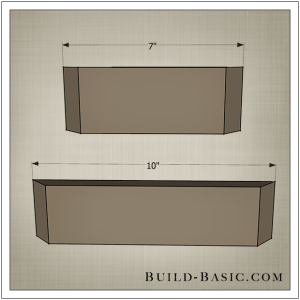

ii. Cut and Prep the Panel
Using a miter saw, cut a board or piece of plywood to the dimensions noted in the cut list above. Using a pocket hole jig and a drill/driver, create two pocket holes along the shorter sides of the Panel, and three pocket holes along the longer sides of the Console.
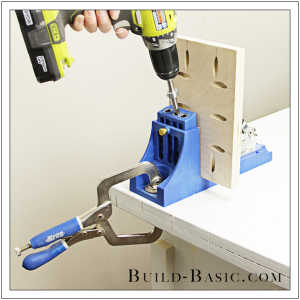

three. Fit the Panel
Surroundings the Panel with the ane x 3 Sides, placed on border. Ensure the miter joints close tightly around the Console. Remove the Sides, and then apply glue along one edge of the Panel.
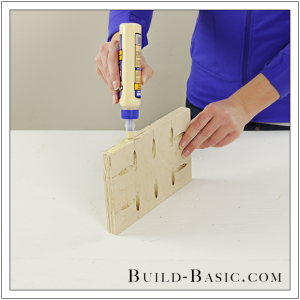

4. Attach the Get-go Side
Lay the first Side flat on the work surface, every bit shown. Place the Panel onto the lath so that the face with the pocket holes sets affluent with the edge of the board. Slide the Console side to side until its ends rest forth the within border of each miter. Using a drill/driver, drive 1¼-inch pocket hole screws through the Panel and into the ane x three Side.
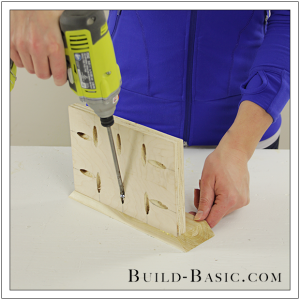

v. Install a Second Side
Utilise glue to a second side of the Console and to an exposed miter joint on the first Side. Place the adjoining Side against the Console, and and so screw it into identify using a drill/commuter a one¼-inch pocket pigsty screws.
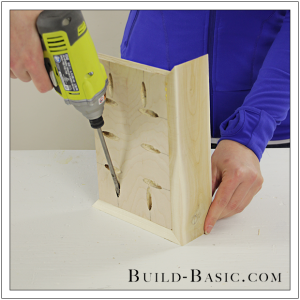

vi. Attach the Remaining Sides
Using a drill/driver and screws, attach the remaining Sides, beingness sure to apply forest mucilage forth the edge of the Panel and to the miter joints.
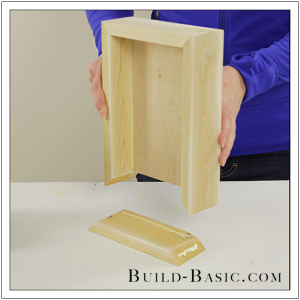

7. Cut out the Shape
Impress or depict the state on a piece of paper. Cut out the shape, and and then trace information technology onto the ¼-inch-thick hobby lath. Replace the blade of your jigsaw with a thin scrolling blade so that information technology tin hands maneuver effectually the curves, and then cut out the shape. Using s sanding sponge, polish the cut edges of the shape. Now is likely the best fourth dimension to use paint or stain to all the parts and employ any graphic paper to the Panel.
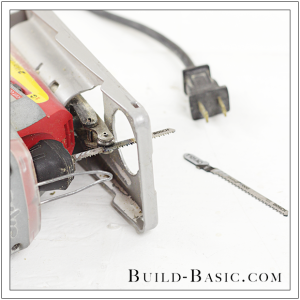

eight. Finish the Pieces and Install the Spacer Block
Identify the Spacer Block in the centre of the assembled frame, or wherever information technology tin best hibernate backside the cutout, and then marker its location. Remove the Block, apply glue to its backside, and and so set information technology back in place. Terminate by securing the Block with a nail that's at least one½-inches-long.
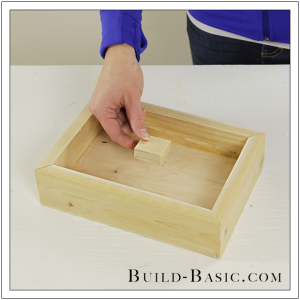

9. Prep the Shape
Place the State onto the Cake to visually determine it positioning. At present remove the State, and apply mucilage to its backside where it will touch the Spacer Block.
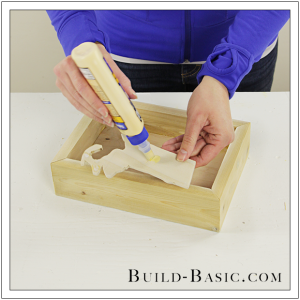

10. Install the Country
Place the State onto the Spacer Block, repositioning information technology as needed. Terminate the installation by nailing one 1½-inch nail though the State and into the Spacer Block—being sure not to hit the nail installed in Step 8. End by touching up the nail hole with woods filler and paint or stain, if desired.
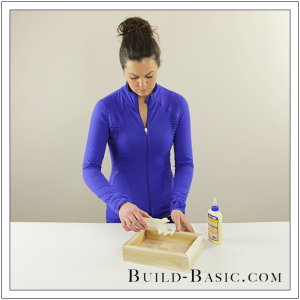

MORE BUILDING PLANS
kincheloehositany78.blogspot.com
Source: https://build-basic.com/build-a-diy-shadow-box-frame/
0 Response to "what to use for a shadow box base"
Post a Comment